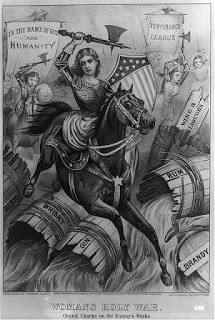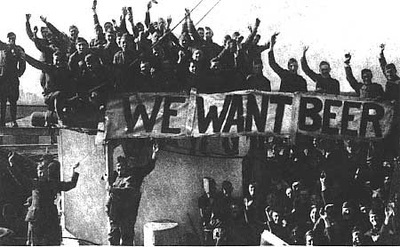Teetotaler, or Just Temperate?
 Temperance as 'holy war'
Temperance as 'holy war'Currier & Ives lithograph 1874
Library of CongressWhile I was researching my latest book, The Dala Horse , I read in Charles H. Russell's wonderful biography of Elise Waerenskjold that she and her husband had attempted to form a temperance society after they immigrated to Texas from Norway. They came to Texas in 1847. By 1855 they determined some temperance was in order.
Their guidelines were a little softer than the zero tolerance policies embraced later. Apparently some of the 'Texwegians' enjoyed a nip of brandy a little too often. And who could blame them - life was tough out there on the prairie! Elise's proposed temperance society aimed to eliminate drinking to excess, rather than eliminating drinking altogether. Beer and wine consumption was considered so harmless, it wasn't even included in their plans. But there was a disagreement how to handle hard liquor, or 'spirits'. Some felt it should not be allowed at all. It became clear this stance was a deal-killer, so in the interest of compromise, all agreed some hard liquor could be imbibed, as long as not to excess.
When I think of temperance, I envision early 20th century women in long skirts and big hats hoisting homemade placquards as they march on their local Main Street. Turns out I was only off by about a hundred years. By the 1830s it was already a thing, with movements documented in America, England, Australia, and New Zealand. There were societies, and songs, and pledges, and everything! Early temperance groups rarely pushed for government regulation of alcohol. Rather, they encouraged individuals to take personal responsibility. The Sunday pulpit and the local newspaper were the main vehicles of imparting this message.
Initial temperance movements focused on exactly that: tempering one's habits. Inevitably a splinter group formed, pushing to completely ban consumption. This view was labeled 'teetotalism'. Growing up in the south, I often heard non-drinkers described as teetotalers.
Let's digress for a moment and explore the origins of this word. There is a rather unkind anecdote suggesting it arose from one fellow's unfortunate speech impediment when trying to express that he was t-t-totally against drinking alcohol. Another theory is the repetition of the T in Total - "Tee Total" - adds emphasis to the speaker's strong belief in the philosophy.
The temperance movement gained momentum until it hit a speed bump in the U.S. during the Civil War. Temperance is all well and good, you see, until we need some taxes to pay for our war. Then we need to let the alcohol flow so we can collect the duties on it.
After the Civil War ended, and the need for alcohol duty income waned, the temperance movement resumed and became as powerful as it ever had been - until World War I. Ironically, rather than being seen as a way to generate tax income, alcohol production was now viewed as a frivolous waste of resources.The temperance societies thus got an unexpected boost in the early 20th century when alcohol supplies dwindled.
 Supporters of temperance saw an opportunity. They pressed their advantage. Groups of women thronged outside of bars, shaming the occupants by singing hymns at the top of their voices. They staged the temperance version of sit-ins, but instead of sitting, they poured out or otherwise destroyed enormous quantities of (perfectly good) alcohol. There was even something called the Whiskey War in Ohio. Extreme Teetotaler Carrie Nation was known for busting up many a whiskey keg with her fearsome hatchet.
Supporters of temperance saw an opportunity. They pressed their advantage. Groups of women thronged outside of bars, shaming the occupants by singing hymns at the top of their voices. They staged the temperance version of sit-ins, but instead of sitting, they poured out or otherwise destroyed enormous quantities of (perfectly good) alcohol. There was even something called the Whiskey War in Ohio. Extreme Teetotaler Carrie Nation was known for busting up many a whiskey keg with her fearsome hatchet.These stunts had the desired effect. What could be seen as their biggest success to date resulted occurred in the U.S. in 1920 with the passage of 18th amendment. This outright ban of alcohol sales at the federal level became known as the Prohibition Era. Other countries such as Australia, New Zealand, Norway, Finland, and Iceland also experimented with varying degrees of prohibition, such as reducing the alcohol content of some beverages, and mandating earlier closing times for bars.
Alas, it was not meant to last. People got downright cranky about not having any booze. The temperance movement fell out of favor. Citing rising crime rates related to black market (think Untouchables which btw is a pretty good movie if you haven't seen it), as well as a negative effect on the economy (again with the taxes or lack thereof), Prohibition ended in 1933. This was not the end of temperance; just the end of it being supported via national law.
 And so the pendulum swings the other wayDespite its disappointing defeat with the repeal of Prohibition, temperance has rocked on in some sectors. Many religions have a long history of banning alcohol, without any help from the federal government. Muslims and Mormons come to mind. Growing up as a Southern Baptist, I can report that we were expected to abstain (other religions used real wine during their communions; Baptists used grape juice). In the American South, abstention was often the rule rather than the exception. Areas of my hometown of Dallas, Texas, were 'dry', meaning no alcohol was sold there. And many counties throughout the state were dry as well. But economics will out: many of these formerly dry areas have become wet over the last twenty years or so. And when these areas become 'wet', their economies really boom.
And so the pendulum swings the other wayDespite its disappointing defeat with the repeal of Prohibition, temperance has rocked on in some sectors. Many religions have a long history of banning alcohol, without any help from the federal government. Muslims and Mormons come to mind. Growing up as a Southern Baptist, I can report that we were expected to abstain (other religions used real wine during their communions; Baptists used grape juice). In the American South, abstention was often the rule rather than the exception. Areas of my hometown of Dallas, Texas, were 'dry', meaning no alcohol was sold there. And many counties throughout the state were dry as well. But economics will out: many of these formerly dry areas have become wet over the last twenty years or so. And when these areas become 'wet', their economies really boom. In hindsight, it appears the heavy hand of government intervention that resulted in the Prohibition era was perhaps not the best solution for encouraging temperance. The early adopters had the right of it: let each of us govern ourselves. Enjoy responsibly.
This post represents my participation in the 2016 A to Z Blog Challenge. We're working our way through the alphabet with posts relating to a different letter most days throughout April. Would love to hear from you in the comments section below. Thanks for dropping by!
Published on April 22, 2016 07:38
No comments have been added yet.



